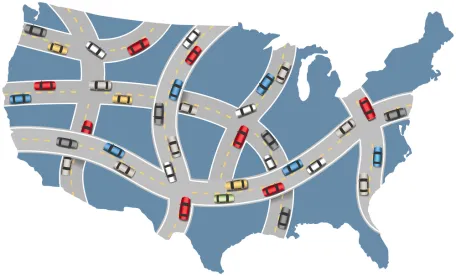This update helps automotive suppliers inform their legal and operational decisions to help address challenges and opportunities.
Key Developments
-
Foley & Lardner provided an overview of recent developments in design patent protection for automotive component parts.
-
Projections for 2023 U.S. new light-vehicle sales are in the range of 14.1 million units to 14.9 million units, according to estimates from Cox Automotive, Edmunds and LMC Automotive.
-
New vehicle inventory at the end of November was up by approximately 80% compared to the same period one year ago, but supply remains low when measured by pre-pandemic standards.
-
According to analysis from PwC, global automotive M&A deal volumes from January to mid-November 2022 were down by 18%, and deal value fell by 62% compared to performance in 2021. PwC expects automotive deal volumes to “remain stable” in 2023, amid a disciplined environment for capital deployment resulting from inflation and higher interest rates.
-
Stellantis will indefinitely idle production at its Jeep Cherokee assembly plant in Belvidere, Illinois, in a decision attributed to factors including increased costs related to vehicle electrification.
-
New analysis from the American Transportation Research Institute predicts full electrification of the U.S. vehicle fleet would require 40.3% of the nation’s existing electricity generation, on average, of which 26.3% would support passenger vehicles and 14% would support freight trucks.
-
The Treasury Department and Internal Revenue Service issued a Revenue Procedure which clarifies certain processes pertaining to the Inflation Reduction Act’s electric-vehicle tax credits for qualified manufacturers’ written agreements and reports. On Dec. 19, the Treasury Department announced it will issue proposed guidance for critical mineral and battery component requirements in March 2023.
-
The United Auto Workers won an election at the Ultium Cells battery plant in Ohio, with 710 employees voting in favor of union representation and 16 opposed.
-
BloombergNEF estimates lithium-ion battery pack prices increased 7% during 2022, and prices are projected to remain elevated until sometime in 2024 due to supply limitations and higher costs for materials such as cobalt, nickel and lithium.
-
Gabe Klein, Executive Director of the Joint Office of Energy and Transportation, estimated $90 billion in infrastructure investments will be required to meet the Biden administration’s goal to establish a nationwide network of 500,000 charging stations. The remarks occurred during the recent White House Electrification Summit, which focused on opportunities and the required infrastructure upgrades related to the electrification of transportation and buildings. The Joint Office of Energy and Transportation is preparing to finalize rules and minimum standards for chargers installed using $7.5 billion in funding from the Bipartisan Infrastructure Law.
-
The California Energy Commission approved a $2.9 billion plan to install 90,000 new EV chargers across the state, which is more than double the 80,000 chargers already installed. The state intends to reach installations of 250,000 chargers by 2025.
Market Trends and Regulatory
-
A new report from the U.S. Environmental Protection Agency found the “average estimated real-world CO2 emission rate” for all new model year 2021 vehicles fell to 347 g/mi, representing a decrease of 25% since 2004.Real-world fuel economy was 25.4 mpg fleetwide, which is unchanged from the 2020 model year, but down by 32% since 2004. The report also indicates the Detroit Three automakers produced vehicles with higher emissions and lower fuel economy for model year 2021 vehicles when compared to a number of their competitors.
-
The National Highway Traffic Safety Administration opened a probe into the autonomous driving system used by GM business unit Cruise, following reports the vehicles may become “immobilized while operating” or engage in “inappropriately hard breaking.”
OEMs/Suppliers
-
Magna announced plans to acquire Veoneer Active Safety from investment firm SSW Partners for $1.53 billion in cash. The deal is expected to enhance Magna’s capabilities in Advanced Driver Assistance Systems (ADAS).
-
A decision by Stellantis to scale back its manufacturing footprint in China occurred amid a broader trend of increased competition to global automakers from Chinese brands, according to a report in The Wall Street Journal.
-
The Insurance Institute for Highway Safety found 15 out of 20 automakers have fulfilled a voluntary commitment to equip nearly all the light vehicles they produce for the U.S. market with automatic emergency braking (AEB).
-
According to an update from the UAW, a British report released this month suggests a number of major automotive brands could have potential supply chain exposure to forced labor in China’s Xinjiang region.
Connected/Autonomous Vehicles and Mobility Services
-
Apple is reported to be no longer pursuing a fully autonomous system for the debut of its electric self-driving car, and the future vehicle’s launch has been pushed back to 2026, according to unnamed sources in Bloomberg.
-
Motional and Uber Technologies announced plans to launch a public robotaxi service in Las Vegas in 2023.The launch is part of a 10-year partnership between Uber and the autonomous driving joint venture of Hyundai Motor and Aptiv Plc.
-
As part of a new strategic partnership, Volvo Autonomous Solutions will provide autonomous freight capacity to Uber Freight shippers beginning on select routes in Texas.
Electric Vehicles and Low Emissions Technology
-
Hyundai and South Korean battery maker SK On plan to invest $4 billion to $5 billion to build a new electric vehicle battery plant in Bartow County, Georgia. The automaker recently broke ground on a $5.5 billion electric vehicle and battery plant in Bryan County, Georgia.
-
Battery materials recycler Redwood Materials will invest $3.5 billion to develop a site near Charleston, South Carolina, with the goal to eventually manufacture enough critical battery components to power more than a million electric vehicles a year. This represents the company’s second site in addition to its battery-materials plant in northwest Nevada.
-
Lear will establish a manufacturing site in Independence Township, MI to produce electric vehicle battery disconnect units and interconnect cell boards. The Michigan Economic Development Corp. approved incentives for this project, which is one of several expansion projects the company has planned in the state.
-
Ford added a third shift at its plant in Dearborn, Michigan, for the purpose of increasing production of the F-150 Lightning electric pickup. Ford previously indicated it will target F-150 Lightning annual production volumes of 150,000 by the third quarter of 2023.
-
Panasonic will supply EV maker Lucid Group with lithium-ion batteries as part of new multi-year sourcing agreement.
-
Canadian electric vehicle charging company FLO started production at its new $3 million assembly and testing facility in Auburn Hills, Michigan last week. The company estimates it will achieve sales of 250,000 chargers by 2028.
-
Toyota and Texas-based electric transmission and distribution company Oncor Electric Delivery will collaborate on a pilot project involving vehicle-to-grid technology (V2G). V2G may help EVs send energy from their batteries back onto the electric grid.
-
South Korea-based charging company Chaevi opened an office in Silicon Valley and plans to build an ultra-fast network of charging stations in the U.S.
-
Vietnam-based EV manufacturer VinFast filed for an initial public offering in the United States. VinFast exported its first batch of VF 8 crossovers to the U.S. this month, and the company hopes to begin production in 2024 at an upcoming manufacturing plant in North Carolina.
-
Investors including Microsoft’s Climate Innovation Fund participated in a $214 million Series C funding round in silicon battery startup Group14 Technologies. The Washington-based company indicates its silicon-carbon technology is more efficient than existing graphite technology, and it could result in more powerful batteries for markets including EVs.
-
Envision AESC will invest $810 million to build a new battery manufacturing plant in Florence County, South Carolina in support of its multi-year partnership with BMW.
-
Mahindra plans to invest $1.2 billion to establish an electric vehicle manufacturing plant near Pune, India.
Analysis by Julie Dautermann, Competitive Intelligence Analyst






 />i
/>i

